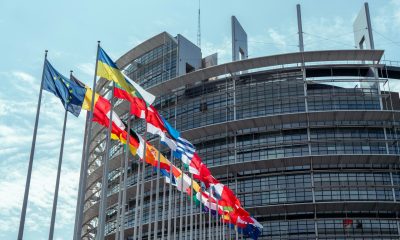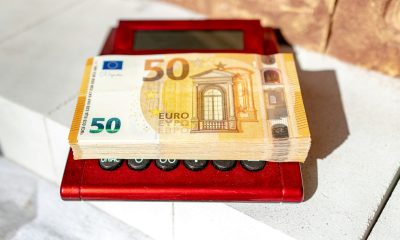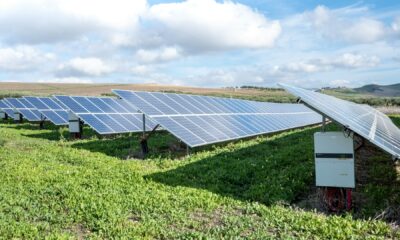Featured
The EU Commission is asking governments to prioritize green investments
Experts from the European Commission for Sustainable Finance issued a warning to governments, to also consider the environment to direct funds for recovery.The TEG has developed three tools that can immediately guide the plans of both governments and the private sector. Among them is Sustainable Taxonomy which provides a framework for future recovery measures and the Green Bond Standard.

The appeal launched by the European Union’s Technical Expert Group on Sustainable Finance (TEG), set up by the EU Commission in June 2018 to set the rules for investing in a green economy reads as follows: “The opportunity for a resilient, sustainable and fair economic recovery is right in front of us. We encourage all governments, public institutions and the private sector to use the right tools for the purpose. And to seize this opportunity.”
For almost two years now, they have been working to determine which economic activities can be considered sustainable, how to direct private capital, in addition to public capital, towards a green economy. Now that Europe and individual governments are allocating billions for economic recovery from the crisis triggered by the coronavirus, the EU Commission turns directly to EU governments and asks them to also use environmental criteria to direct the funds allocated for recovery.
Find out more details about the importance of a sustainable recovery from the COVID-19 crisis and read the latest business headlines with the Born2Invest mobile app.
Europe continues to work on the rules for a sustainable economy
The ongoing health crisis and the resulting economic paralysis have not stopped the work being done in Brussels around the rules for sustainable finance. After the agreement between the committee, the Council and the EU Parliament reached last December and after the publication of the Teg final report (on March 9th), the Council of the European Union approved on April 16th, the regulation to classify sustainable economic activities. In order for the regulation to become official, the Parliament’s second reading is now missing.
“This is an important job,” said Anna Fasano, President of Banca Etica, “to have a common vocabulary within the European Union is a step towards the recognition of a type of finance and sustainability that does not aim at mere speculation. It aims to support the real economy, to disinvest from companies involved in the production of weapons and fossil fuels and instead support companies that care about the environment, the rights of workers and local communities.
The achievement of climate neutrality by 2050 is one of the targets of the Green Deal
This is precisely what the European Commission’s experts warned: “We are experiencing an unprecedented crisis,” they wrote in a statement, “while preparing plans for economic recovery from the COVID-19 pandemic crisis, governments, and the private sector must pay attention to the details, what in practice must look like a resilient, sustainable and fair recovery, to ensure greater resilience to further environmental and social crises in the future.”
“The members of the European Council have identified the central role of the Green Deal in their Roadmap for Recovery from the COVID-19 pandemic,” Teg members explained. “The Green Deal includes the achievement of climate neutrality by 2050 and other climate targets for 2030 that are currently being set. These environmental targets must be used to calibrate responses for recovery.”
“Recovery plans should not support environmentally or socially harmful activities, which would worsen current and future crises, by locking us into highly polluting infrastructure. Also, they should not promote those activities that do not contribute to social well-being for the coming decades.”
The tools to drive a sustainable recovery
Now that decisions on recovery policies have to be taken,” EU experts ask, “governments consider it essential that the appropriate instruments be used for this purpose.”
The instruments the Commission is referring to is Sustainable Taxonomy, the standard for Green Bond and Benchmark Paris Aligned and Climate Transition. In short, the chapters to which the expert group has been asked to work for almost a year by the European Commission to find ways to finance the transition to a sustainable economy.
The TEG has developed three tools that can immediately guide the plans of both governments and the private sector:
Sustainable Taxonomy provides a framework for future recovery measures. It presents the environmental performance and minimum social standards that are necessary for economic activities to achieve climate and environmental objectives, including climate neutrality by 2050 and ambitious targets by 2030. It is particularly relevant to the new investments that are necessary for the transition of economy, showing how and where to cut greenhouse gas emissions, build resilience to climate effects, optimize production chains towards sustainability and stimulate job creation.
The Green Bond Standard presents the best practice model. It provides all emitters with elements that can be applied to explain how their financing contributes to the broader sustainability strategy and the resulting environmental and social impacts. The standard framework can also be applied to increase transparency regarding social impacts and financial results.
The two Benchmarks “Paris Aligned” and “Climate Transition” are tools to support the allocation of large amounts of private capital to climate transition. They do this by aligning investors’ portfolio choices with climate change objectives, in particular with the IPCC’s 1.5 °C trajectory.
These tools for sustainable finance, the Teg experts wrote, “can guide public and private programs for recovery from the COVID-19 pandemic, including the Roadmap to Recovery recently announced by the European Council.
__
(Featured image by geralt via Pixabay)
DISCLAIMER: This article was written by a third party contributor and does not reflect the opinion of Born2Invest, its management, staff or its associates. Please review our disclaimer for more information.
This article may include forward-looking statements. These forward-looking statements generally are identified by the words “believe,” “project,” “estimate,” “become,” “plan,” “will,” and similar expressions. These forward-looking statements involve known and unknown risks as well as uncertainties, including those discussed in the following cautionary statements and elsewhere in this article and on this site. Although the Company may believe that its expectations are based on reasonable assumptions, the actual results that the Company may achieve may differ materially from any forward-looking statements, which reflect the opinions of the management of the Company only as of the date hereof. Additionally, please make sure to read these important disclosures.
First published in valori, a third-party contributor translated and adapted the article from the original. In case of discrepancy, the original will prevail.
Although we made reasonable efforts to provide accurate translations, some parts may be incorrect. Born2Invest assumes no responsibility for errors, omissions or ambiguities in the translations provided on this website. Any person or entity relying on translated content does so at their own risk. Born2Invest is not responsible for losses caused by such reliance on the accuracy or reliability of translated information. If you wish to report an error or inaccuracy in the translation, we encourage you to contact us.

-

 Crypto4 days ago
Crypto4 days agoTariff Turmoil Sends Bitcoin and Ethereum Lower as Crypto Markets Face Mounting Pressure
-

 Markets2 weeks ago
Markets2 weeks agoMarkets, Jobs, and Precious Metals Show Volatility Amid Uncertainty
-

 Crypto16 hours ago
Crypto16 hours agoEthereum Outlook: Key $2,190 Resistance, Whale Accumulation, and Buterin’s Push for True DeFi
-

 Cannabis1 week ago
Cannabis1 week agoAI Can Mimic Psychedelic Experiences but Cannot Truly Feel Them, Study Warns
























